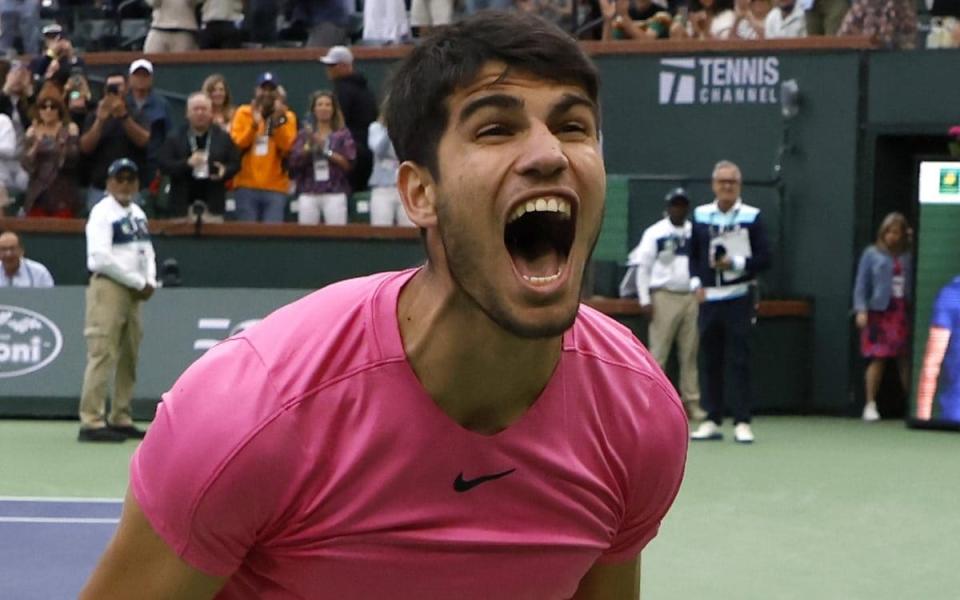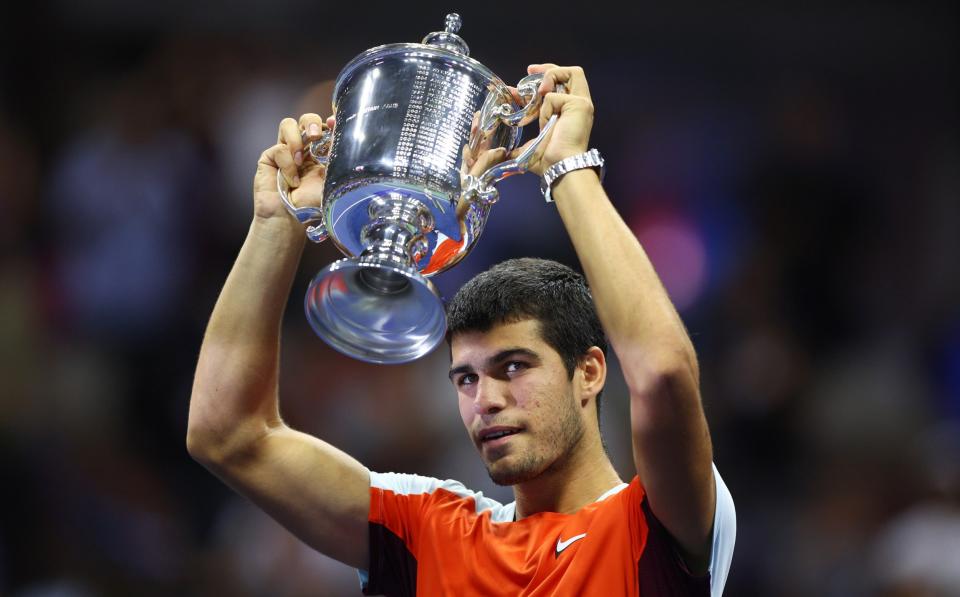Carlos Alcaraz must dethrone Rafael Nadal and Novak Djokovic to become new king

Ranked at No 100 in the world, Argentina’s Facundo Bagnis is not a man regularly tipped for Wimbledon glory. But neither is he used to the sort of treatment he received in Miami on Friday afternoon.
After just 23 minutes of his second-round match, Bagnis was already a set down, and had barely won a point. He was not playing badly, exactly. He was just up against the subtle drop shots and light-speed forehands of Carlos Alcaraz – the 19-year-old from Murcia in southern Spain who is fast becoming tennis’s latest apex predator.
“He’s going to be one of the best players of all time,” Mats Wilander, the Eurosport pundit and seven-time slam champion, said this week. “When Alcaraz is in charge of the rally he has so many more options than any tennis player I’ve ever seen except Roger Federer.”
Let us sketch in some of the facts. On capturing his maiden slam title in New York last September, Alcaraz became the youngest world No 1 in history, eclipsing Lleyton Hewitt’s record by a massive 16 months. A fortnight ago in Indian Wells, he ticked off another landmark by scoring his 100th tour-level win after just 132 matches – the second-fastest on record behind John McEnroe.
In light of all these accomplishments, you might think it strange that we are not talking about Alcaraz all the time. You might expect his Calvin Klein underwear campaign – in which he shows off the most muscular teenage frame since a young Rafael Nadal – to be only the start of a barrage of posters and advertising reels.
Yet there is one significant thing missing from Alcaraz’s CV. Yes, he has already established himself as the finest young prospect to have emerged in 15 years. Yes, he has gone almost unbeaten this season (losing only a single match, to Britain’s Cameron Norrie, in Rio a month ago). But in order to make his No 1 ranking feel genuine, he still needs to take on one of the dominant forces of recent times – either Nadal or Novak Djokovic – when they are revved up and rumbling at a grand-slam event.
Tennis needs a Madison Square Garden-style showdown. It needs a transfer of belts, a heavyweight collision that eliminates all the faff of the tour and puts the big boys on stages together. It needs a moment that says, “The king is dead, long live the king”. And for all Alcaraz’s facility in duffing up the rank and file (Bagnis eventually got on the scoreboard before going down 6-0, 6-2), he has yet to have that opportunity.

In Nadal’s case, it is because the French Open champion has been no more than an occasional visitor to the match court for the past nine months. It is different with Djokovic, though. The fact that he and Alcaraz have played only once – and that on the anomalously high-altitude clay courts of Madrid in May last year – is a peculiar quirk of tennis’s recent narrative. They resemble a pair of positive magnets that keep repelling each other.
Djokovic sat out the US Open, Indian Wells and this week’s event in Miami because of his hardline stance on Covid (combined with United States immigration’s ongoing demand for vaccination certificates). Alcaraz had to skip the Australian Open after straining a thigh. Each time one of them goes missing, the other invariably lifts the trophy.
While the delay feels frustrating, an optimist might say that the tension is building nicely. The pay-off will probably come on the clay courts of Monte Carlo, Madrid or Rome. Even then, though, you really want to see Alcaraz doing battle with Djokovic or Nadal over the blue-riband distance: best-of-five sets in Paris, London or New York.
That would be the real acid test, and would fulfil a point McEnroe has often made: for the succession to feel real, you want tennis’s next champion or champions to take on the ancient regime of Djokovic and Nadal (it is already too late with Federer) and defeat them in hand-to-hand combat, rather than simply inheriting their mantle because of age or injury.
In Alcaraz’s case, Friday’s coruscating display against Bagnis only underlines his status as the runaway favourite to defend his Miami title next weekend. And yet, until he encounters one of the two men with real locker-room power, it is impossible to know whether he is a flat-track bully or the new emperor of tennis.

 Yahoo Sport
Yahoo Sport 




































































